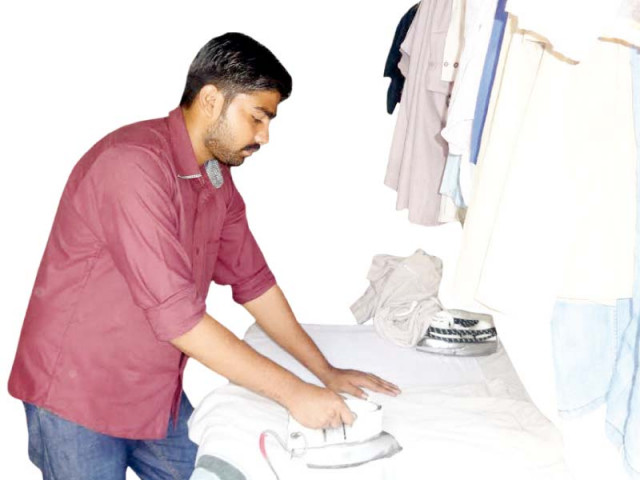Camel Jockeys: Popular Arab sport costs Pakistani boy his sanity
Children were tortured, abused and forced to take part in camel races

PHOTO: EXPRESS
He is working on a two-year contract on a monthly salary of Rs17,000 and resides in one of the compounds provided by the CPWB. The CPWB’s Supervisor Ghulam Murtaza says the young man is mentally unfit. He says that Shafiq, like many others in the district, is suffering because of the abuse faced as a child camel jockey in the Gulf States.
Police recover another tortured child maid
Shafiq’s case is not an isolated one. At least hundreds of boys who returned to Pakistan in deplorable conditions years ago are still suffering from the trauma.
The sport, popularity of which rivals that of Formula One, was for years powered by the key ingredient of young boys as jockeys. Being young, they were light and would scream loudly spurring the camels. A steady supply of children from Pakistan satiated the hunger for such jockeys.
The practice continued unabated till the early 2000s when laws, and some technology, sought to put an end to this dark chapter. In 2002, Pakistan ratified the Prevention and Control of Human Trafficking Ordinance (PACHTO) banning trafficking of children to the UAE and other Arab countries.

The same year, the UAE also introduced laws against the use of children under the age of 15 as camel jockeys. However, this law was not actively enforced till 2005 when the Unicef and some other organisations helped end the trend of using boys as camel jockeys.
A lifetime of pain
Born on July 8, 1994, in Dera Ghazi Khan, Shafiq could not even recall his mother’s name or any of his siblings due to his unfit mental condition. While speaking to The Express Tribune he said, “My father passed away in 2002 but I do not know my mother’s whereabouts.” He added, “My aunt Kausar Bibi took me to her house after the death of my father.”
“I do not remember the exact date but it was in 2002 when my aunt sent me to Dubai. She sold me to Sheikh Muhammad Bin Irshad for 500 dirhams, who was a police incharge,” he revealed.
Shafiq added, “Irshad sent us to a camel farm situated in Abu Dhabi where we remained there for over three years.”
He lamented, “I used to work from morning to night and my duties included cleaning the camels, training them, setting up tents and take part in camel races for which I was given training for six months.”
“During this period, I was severely beaten and tortured by the trainers. I also suffered injuries after falling off camels during different races,” he pointed out.
Shafiq tells The Express Tribune, “Such incidents are common in a camel race and those people used to torture us when we made mistakes."
He claimed that he won a number of races during his stay in UAE but he was never given a single penny. “My caretakers would use the prize money. Initially, I was scared but later I learnt the camel riding skills. I used to work seven days a week in extreme heat.”
He maintained, “I was not given any remuneration or cash by the Sheikh but I know that camel jockeys are paid between 800 and 2,000 dirhams a month and 50 to 100 dirhams for winning a race.”
Shafiq elaborated that he took part in around 70 camel races. Many children died during the races when they fell off from the camels. “I am one of the lucky ones, who were recovered from the clutches of the Sheikh in 2005 due to the joint efforts of the Pakistani and UAE governments.”
Child maid's 'torture' moves top judge
Bitter truth
When Shafiq returned from UAE, none of his relatives came to receive him and he had nowhere to go. He was handed over to the Child Protection and Welfare Bureau, Lahore. “I lived there till the age of 18 years. Although, there was a school in the CPWB but I could not get education due to my weak mental condition.”
He said, “Consequently, I was provided laundry training in the CPWB and was given the assignment of the laundry boy.”
He remarked, “In the meantime, I tried to contact my relatives but everyone was hesitant to talk and provide accommodation to me.”
Shafiq informed The Express Tribune, “I have filed a case in the court against my aunt for the recovery of money which is pending. However, I have received an amount of Rs1.1 million from the Dubai government and I will use the money to get settled and intend to continue my laundry job at CPWB.”
Published in The Express Tribune, July 13th, 2017.



















COMMENTS
Comments are moderated and generally will be posted if they are on-topic and not abusive.
For more information, please see our Comments FAQ